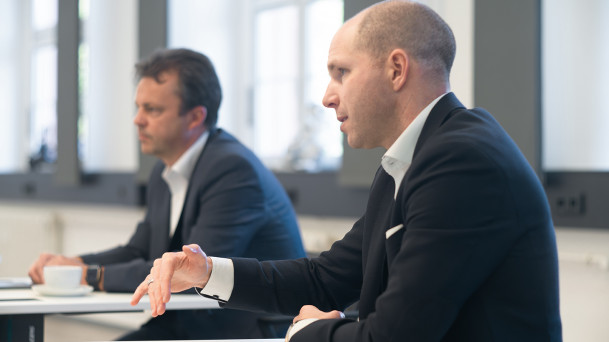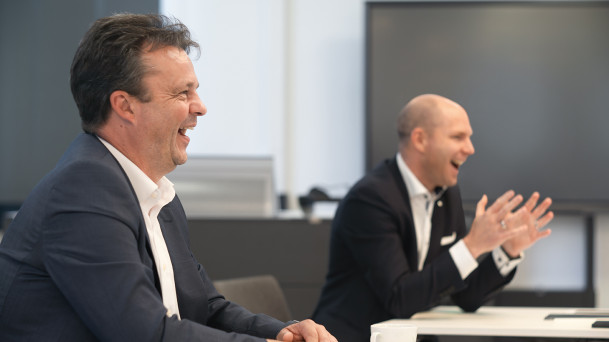Added Value for All
StudiumPlus is a successful model that benefits students in the same way as the university and the companies. We inquired with Prof. Dr. Jens Minnert and Christian Schreier as to why this is the case.
We meet with Jens Minnert and Christian Schreier in a commodious lecture hall. At the entrance, we are greeted by a friendly robot. Quite generally, the whole setting conveys the impression that the future of teaching has already begun with StudiumPlus. And this assumption would certainly not be wrong.
W3+: StudiumPlus started with 31 students and 28 entrepreneurial members in the winter semester of 2011. How many are there today?
Christian Schreier: We have about 1,800 students, more than 500 lecturers and since this summer, there are more than 1,000 entrepreneurial members. Compared to the current numbers, we did indeed start on a shoestring. A lot has happened since then. We have grown enormously here at our main location in Wetzlar. And later on, other branches have successively joined in since 2009: first in Frankenberg and Bad Wildungen, then in Bad Hersfeld and Biedenkopf, Bad Vilbel, and Limburg.
W3+: How did this come about?
Jens Minnert: Well, the initial idea consisted in establishing a range of dual studies under the umbrella of the University of Applied Sciences Mittelhessen (THM) in order to train young people from the region for the region. Our program has always been guided by the requirements of the industrial region and the local companies. Over the years, this idea has sparked off a huge demand and resulted in making us grow with the challenges so to speak. We never wanted to be a campus university but go into the region: that is to say, go to where the requirements are. Sure enough, the variety of our range of studies in Wetzlar and at the branch campuses has differentiated accordingly. By now, our program includes ten accredited bachelor and master degree courses with more than twenty disciplines ranging from business administration, industrial engineering, and construction engineering to electrical engineering and mechanical engineering as well as to process management, software technology, and systems engineering.
W3+: How does it work in practice when concrete requirements are to result in curricular programs?
Jens Minnert: We have created an ideal structure here with which to accomplish it: I for one represent the Academic Center for Dual Studies (ZDH) of the THM which is responsible for the composition, the implementation, and the subsequent development of the range of studies as the provider of the dual study program. My colleague Christian Schreier is Chief Executive Officer of the CompetenceCenter for Dual Academic Study Programs – registered association StudiumPlus (CCD) which combines more than 1,000 partner organizations and institutions. In the directorate of the ZDH, every discipline is represented in terms of content. On the other side, we have the executive board of the CCD which consists of entrepreneurial members. We complement each other perfectly and are on really good terms as colleagues! And that does not only hold true for the two of us.
Christian Schreier: I can verify to that unrestrainedly. What matters is that everyone is interconnected with everybody else, maintaining an intensive and active dialogue. So, when it comes to drawing up new study contents or whole study programs or to refining the existing ones, there are always both sides involved. An advisory board consisting of entrepreneurial partners and academic representatives sees to that. This constellation enables us to quickly and purposefully analyze requirements, conceptualize contents, and integrate them into the teachings.

»About 90 percent of our graduates remain faithful to their companies after graduation. That means, StudiumPlus is a lucrative investment for the partner companies by all accounts.«
Christian Schreier
W3+: Across industries, oriented on demand, extremely close to the practice – this triad characterizes the concept of StudiumPlus. And it does not just exist on paper. What are you doing differently than other universities?
Jens Minnert: If there was a secret to our success, I would surely not disclose it ... (laughs). No, seriously: I think there are several factors to our success which have brought us to where we are today. We created a model from which evidently everyone benefits: the students, the university, and the companies. We have top people who are incredibly dedicated to the program – and this does not only hold true among the lecturers but also within the boards which are mainly staffed with volunteers. In comparison with other universities, we are awfully quick, precisely because the close collaboration with the companies gives us the opportunity to get game-changing topics and issues off the ground early on. And: The individual mentoring of students is really unique with StudiumPlus. At the beginning, each student is assigned to a professor who will supervise them as a mentor and look after them in the companies. Where else do you get that?
Christian Schreier: There is an additional success factor which is of particular significance for the companies in the region: About 90 percent of our graduates remain faithful to their companies after graduation and will continue improving themselves there. That means, StudiumPlus is a lucrative investment for the partner companies by all accounts. It is this additional value which motivates many partner companies to get involved in StudiumPlus deeply and in the long term.
W3+: Everybody is talking about a shortage of skilled workers whereby branches, industries, and academic fields are affected to different extents. Have you also noticed such a development?
Christian Schreier: In the early days, we made huge efforts and did a lot of persuading to attract partner companies. Now, the companies approach us actively because they want to become a member. Unlike in former times, we now have to do more advertising among potential students.
Jens Minnert: At the beginning of this year, we tried out a new format during the university information days. At the Wetzlar campus, we presented our complete study program. 80 partner companies introduced themselves on a big “market of opportunities”. The interest was very keen. Already half an hour before the event officially began, young people crowded in front of the entrance to then gather information about study program conditions or the perspectives within the companies in the casual ambience at the booths of the companies and tutors. This was a positive surprise not only for us but for the companies as well.

»Our concepts are explicitly geared towards making people fit for the future. I think, in this, we succeed on a high level. And that’s why we are able to look optimistically ahead as a university as well.«
Jens Minnert
W3+: Various transformations in the working environment are encroaching upon both the universities and the enterprises to the same extent. How do you manage to adapt the study contents in such cases so that they are fit for the future and in line with the requirements?
Christian Schreier: Digitization and Artificial Intelligence but also mobility or sustainability are important cross-sectional issues which actually affect everyone. Thus, it is all the more important to equip the students with key competencies and qualifications which are and will be in strong demand by the companies. It is exactly in such matters where we have to be extremely innovative and flexible in order to keep pace with the increasingly fast-moving technology cycles. Therefore, we started the master degree course “Future Skills and Innovation” in 2021. Business economists, computer scientists, mathematicians, mechanical engineers, electrical engineers, and other interdisciplinary project and learning groups are working together in this. The knowledge is imparted prevailingly in digital form. On-campus days are used for project work and deepening of knowledge.
Jens Minnert: The mentioned transformation processes do indeed not only apply to the study courses but also to the advanced training and qualification of employees inside the companies. Since 2015, we have been solely responsible for the whole advanced education seminars at the THM. They are already in high demand, and this demand will keep growing. No matter if vocational training or advanced education is concerned – our concepts are explicitly geared towards making people fit for the future. I think, in this, we succeed on a high level which plays a significant part in being able to look optimistically ahead as a university as well.
StudiumPlus
StudiumPlus is the biggest provider of dual study courses in Hesse. Responsible are the Technische Hochschule Mittelhessen (THM) as the biggest university for applied sciences in Hesse, the CompetenceCenter Duale Hochschulstudien – StudiumPlus e. V. (CCD) which combines more than 1,000 partner companies and institutions, as well as the Kammerverbund Mittelhessen headed by the Chamber of Commerce and Industry IHK Lahn-Dill.
